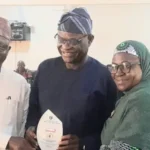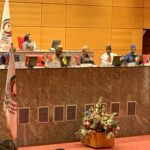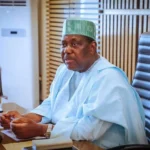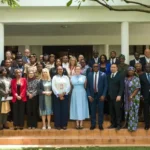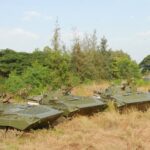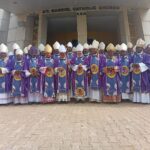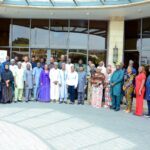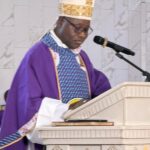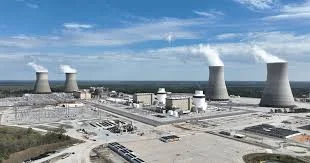By Fabian Ekeruche
Ahead of the Bonn Climate Conference SB62 in Germany, 12 Civil Society Organisations (CSOs) from across African, Europe and Russia have released a report on the growing number of African nations considering nuclear energy as part of their overall energy mix.
This is contained in a statement issued by the Executive Director, Renevyln Development Initiative, Nigeria, Mr Philip Jakpor, on Thursday in Lagos.
The News Agency of Nigeria (NAN) reports that the report is titled: ‘The Alarming Rise of False Climate Solutions in Africa ― The Nuclear Energy Misadventure.’
The statement said the report was prepared by campaigners as a collective advocacy report with a number of strong recommendations that reflect the breadth of their shared concerns about the development of nuclear energy across the continent.
The groups are unanimous in their demand for a nuclear free Africa, safe from the dangers of nuclear energy and instead building a future powered by clean, affordable solutions.
The report listed the countries to include Angola, Burkina Faso, Egypt, Ethiopia, Ghana, Kenya, Morocco, Namibia, Nigeria, Senegal, Tanzania, Rwanda and Uganda.
“They have all made announcements concerning new nuclear power plants. South Africa has the continent’s only operating nuclear power plant, commissioned in 1984 during the apartheid era,” the report said.
It quoted Makoma Lekalakala, Goldman Prize recipient for Africa 2018, in her foreword in the report, as saying that post-carbon economy must be green for sustainability.
“The demand for a Just Transition to a post-carbon economy means it must be green, sustainable and socially inclusive.
“This comprehensive report lays out the case for why the nuclear energy option is not compatible with these demands.
“It shows how the nuclear energy lobby undermines and obstructs the need for net zero to be achieved by 100 per cent clean sustainable renewable energy.
“The report gives details on the extent of plans and announcements to roll out nuclear power plants across the African continent,” Lekalakala said.
The statement said the report explores the numerous reasons why setting up nuclear plant was not the answer to the continent’s effort to reduce emissions.
It added that the urgency of the climate crisis means nuclear energy is too slow to deliver; it is harmful to human health and the environment; and unlike renewables not suited to solving the present problems of energy poverty.
According to the statement, the continent is becoming both a potential testing ground and, in particular, a battleground for conflicting geopolitical influences that are also playing out in the field of nuclear technology exports, or rather the prospect of such exports.
It added that at the same time, the nuclear energy lobby is extensive, well-funded and global PR effort, including at UNFCCC climate meetings is also documented in the report.
The statement said the authors of the report called for an end to plans and announcements to spend billions on building new nuclear power plants.
They argued that three quarters of Africa’s climate finance needs were not met with more than half of existing climate finance in debt instruments.
“This report makes clear that Africa’s energy needs do not require nuclear power.
“The way forward clearly lies in funding clean, safe renewable energy sources, of which the continent has an abundance,” the statement said.
The statement also quoted Mr Philip Jakpor Executive Director Renevyln Development Initiative (RDI), as describing nuclear plans as “misadventure.”
“Nuclear plans are a “misadventure”. Nigeria is not ready to host nuclear plants because we don’t have the capacity to manage it.
“We’ve had longstanding difficulties with oil and gas infrastructure where pipelines are frequently the target of sabotage, theft or terrorism, causing enormous environmental damage in the Niger Delta.
“A nuclear power station would inevitably become a “target of terrorists”. Security at a nuclear power station would need to be akin to a “military base” probably protected by another country such as Russia,” Jakpor said.
The Executive Director 360 Human Rights, Mr Alberta Kpeleku, was quoted as saying that it was time for Ghana to reject nuclear power plans.
“From environmental disasters to health risks and economic concerns, it’s time for Ghana to reject nuclear power plans.
“There are far too many risks. Nuclear accidents, radioactive waste, health risks, security threats, nuclear proliferation, terrorism.
“The devastating effects of nuclear accidents do not affect the present generation alone but also generations yet unborn.
“Alternatives and solutions for nuclear energy include renewable energy sources—solar, wind, hydro, and geothermal—which should be prioritised,” Kpeleku said.
Other CSOs include Ecodefense (Russia), International Physicians for the Prevention of Nuclear War (Germany Affiliate), Renevlyn Development Initiative (Nigeria), Resilient 40 (African Climate Network)
Also included are: The Southern African Faith Communities’ Environment Institute (South Africa), Tipping Point North South (UK), Uganda Environment Action Now (Uganda). (NAN)(www.nannews.ng)
Edited by Chinyere Joel-Nwokeoma


